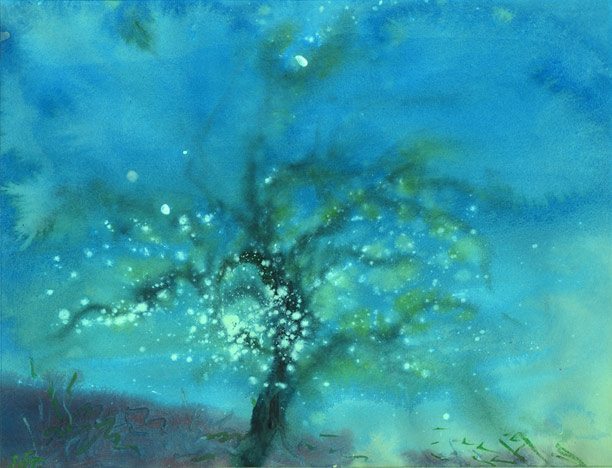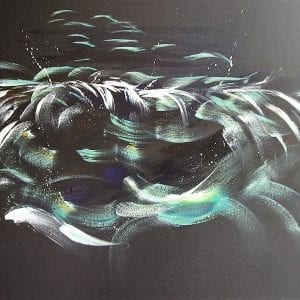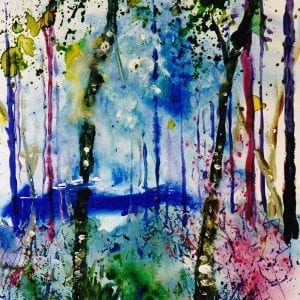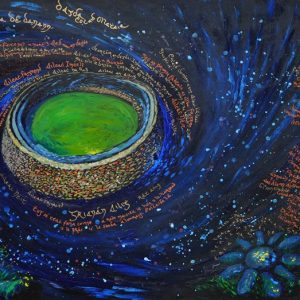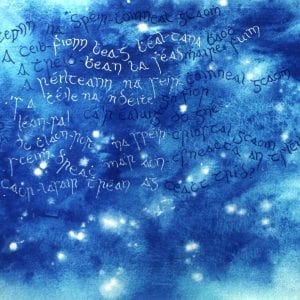Description
An Draighneán Donn : The Blackthorn Hedge
An Scéal : The Story
A young man from an island off the coast of Donegal fell in love with a beautiful girl from the mainland. They agreed to get married, so in order to seal the promise they gave each other a ring to wear – a token of their mutual, undying love. But circumstances changed in the course of time and the parents of the girl talked her into marrying an older man who had plenty of money and plenty of land.
She didn’t contact the young man about her new plans but instead went ahead with the wedding celebrations, beginning with a party, the night before the wedding, for all her friends and neighbours. The young man somehow heard about the party and decided to go along himself…disguise as a beggar man. When the drinks were being handed around, the girl herself offered him a glass of red wine. She didn’t recognise him, of course. He took the glass from her, but instead of drinking from it, he dropped the ring inside it – the ring he had popped into his mouth minutes beforehand. He then handed the glass back to her and, naturally, she saw the ring sparkling at the bottom. She looked at him in horror and then, realising who he was, felt ashamed. He didn’t say a word. Silence filled the room when the guests noticed that something had gone wrong. Seeing the silence as his opportunity, the man started to sing “The Blackthorn Hedge”.
An t-Amhrán : The Song
One hundred are thinking that when I’m drinking I am surely theirs
Twice that amount doesn’t even count when I think of their talk with me
Snow falling faintly and faintly falling on Flynn’s gallant braes
Her bosom is like the white sloe blossom on the blackthorn hedge
It’s only a fool would strive to climb the tallest tree
Whilst down beside it the smallest branches yield easily
And though the rowan is fiercely growing its berry is hard to eat
But blackberries and raspberries are growing in plenty on the trees that grow at your feet
If I were a boatman I’d sail the ocean over the waves to my love
If I had learning I’d write some verses with a fine quill pen
Alas that she and I can’t ever be – she who broke my heart –
In a lonely glenside when the sun is rising and the dew’s on the morning grass
If you ever visit come straight to my window at the back of my dwelling house
A quiet evening or an early morning when the dew lies on the grass
Although I am silenced I am still repining deep inside my heart
O you are my first love and I cannot stop, love, this pain inside my heart
[translation by Seoirse Ó Dochartaigh]
An Cúlra : The Background
This Donegal love-song is completely at one with the natural world. Every nuance of human feeling expressed in it corresponds to some naturalistic imagery in the Irish landscape. The most pristine of all the images is perhaps the modest little white flower on the blackthorn hedge itself – bláth na n-áirní – which could be seen as a primeval symbol of renewal or rebirth. On another level, this striking white blossom, set against its black, needle-like thorns, is another way of looking at the welcoming light of morning against the foreboding darkness of night
The long, melodic line of the tune itself has parallels in nature as well. To me, it’s the musical equivalent of a jagged branch sprouting out from some hedgerow…the music of nature itself…like bird-song.
An Draighneán Donn
Sílfidh céad acu gur leo féin mé nuair a ólaim leann
Théid dhá dtrian síos domh nuair a smaointím ar a gcomhrá liom
Sneachta séidte agus é dá shíor-chur ar Shliabh Uí Fhloinn
Tá mo ghrá-sa mar bhláth ne n-áirní ar an draighneán donn
Fear gan chéill a bheadh a’ dréim leis an chraobh tá ard
‘S an crann beag íseal lena thaobh sin ar a leagfadh sé a lámh
Cé gur ard an crann caorthainn bíonn sé searbh os a bharr
Fásfaidh sméara ‘gus bláth sú craobh ar an chrann is ísle bláth
Dá mbínn im’ bhádóir ba deas a shnámhfainn an fharraige seo anonn
Dá mbíodh léann agam scríobhfainn líne le barr mo phinn
Monuar géar gan mé agus tú a chráigh mo chroí
I ngleanntán sléibhe le héirí gréine ‘gus an drúcht ‘na luí
Má thig tú choíche tar san oíche go cúl an tí
Tráthnóna nó ar moch ar maidin nuair a bíos an drúcht ‘na luí
Cé nach labhairim-se bím a’ meabhrú go domhain fá mo chroí
‘S tú mo chéad searc agus ní féidir mo chumhaí a chloí
